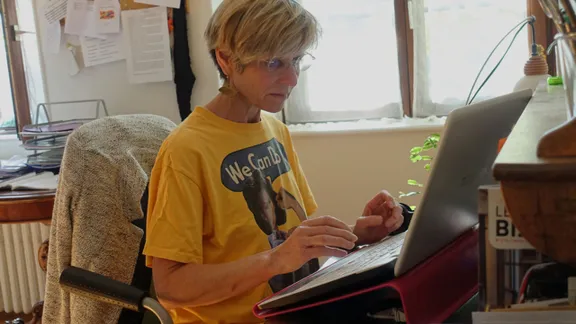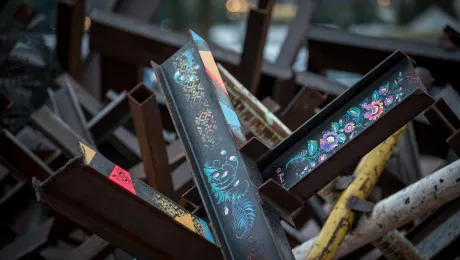
Rev. Ruth Wolff-Bonsirven, âinspectrice ecclésiastique with the Union of Protestant Churches in Alsace and Lorraine writes her daily reflection on 9 May. Photo: Wolff-Bonsirven
A French pastor reflects on her experience of the virus and how it can help in responding to traumatized communities
(LWI) - “My experience of the Coronavirus disease (COVID-19) has left a profound sense of humility, and a deeper understanding of how we live by grace alone. My task now is to support other pastors as they accompany anxious, sick and grieving individuals and families.”
Rev. Ruth Wolff-Bonsirven, is an ‘inspectrice ecclésiastique’ or leader of the church in Alsace-Lorraine in eastern France. In mid-March she became sick with the COVID-19 virus, just as the death toll and the numbers of infections were rising rapidly in countries around the globe. When her symptoms worsened, she spent two days in hospital as doctors tried to manage the intense pain in her back, stomach and chest. Even when she recovered enough to return home, the illness left her exhausted and unable to do any work for several weeks.
“I am a leader, a decision-maker in my church, but there I was, unable to do anything, needing the help of others to do even the simplest things,” she says. The Grand Est region of France where she lives was the epicenter of the disease for several weeks, following a meeting of an evangelical megachurch in Mulhouse in February where hundreds of people were infected.
Supporting front line pastors
“It was very traumatic for us because ours was the worst affected part of France for a while,” she recalls. “There were many deaths, especially in homes for the elderly but doctors did not go there and so did not diagnose the virus to begin with. Caring staff, who lacked access to testing and protective clothing, spread the infection and many residents died, but the families could not be with them or even see their bodies after the deaths, so there were no last words for them.”
As she slowly regained her strength, Wolff-Bonsirven realized the urgency of supporting pastors and hospital chaplains on the front lines in responding to the pain of so many grieving families. “How can we help those who have been unable to comfort their dying relatives? What can we do to accompany them through their grief? Listening is important, but often words are often not enough and they need some symbolic gestures to find a sense of closure.”
The words and gestures of pastors gathered with small family groups at cemeteries and gravesides are also of vital importance at this time of heightened trauma for individuals and communities. “Many of these colleagues tell me they feel quite inadequate,” Wolff-Bonsirven reflects. “All their theological training has not prepared them for this and they are afraid that they cannot find the right words.”
Deepening prayer and spirituality
Many pastors are also experiencing feelings of guilt about not going out to work or supporting their congregations in the same ways as before. “Normally, they would be producing so many texts, preparing liturgies and music but with their churches closed, they have been thrown into an uncertain world. Some are living in large rectories with big gardens, while so many of their parishioners live in small apartments with all the problems they’ve experienced during the lockdown.”
Rev. Ruth encourages colleagues to focus on their own spirituality in this uncertain period and to spend time in reading and prayer with family members or alone in a garden, noticing God at work in the natural world. “It is actually a very productive time, when we can develop a new spirituality and deepen our prayer life,” she says. “We have prayer chains, so that we pray together for pastors who are under pressure. I encourage them to stand alongside the families, to listen to God with their hearts, to trust him to find the words that they need.”
Since the lockdown began, she has been writing and sharing a daily reflection entitled a ‘flower of the day’, illustrated by a colleague-photographer who has documented the passage of winter into spring. “As the quarantine began, I feared we would lose our sense of time, but instead we are tuning into a different rhythm of the natural world, where the progression of time is measured through the life cycles of flowers and plants,” she explains.
‘Flower of the day’
Her short reflections contain prayers, inspirational quotes, bible verses and links to online worship and music. They also provide news of the church community, including some surprising developments such as the ecumenical cooperation that has grown out of the crisis. Over the Easter period, the Federation of Protestants in France was able to secure more time on national television and the Union of Protestant Churches of Alsace and Lorraine worked with the Catholic church to broadcast two services on the regional France 3 Alsace channel. An unprecedented joint liturgy on Good Friday garnered unexpectedly high audience ratings.
Wolff-Bonsirven’s daily diary also raises many of the most worrying issues that are emerging as long-term consequences of the Coronavirus crisis. Cases of domestic violence which have increased dramatically during lockdown, or the mental health problems of young people struggling with depression, job losses, feelings of worthlessness and uncertainty about their future. “How will the church reach out to these people now?” she asks.
For me, it was an experience of vulnerability and total dependency on the will of God and of other people who were willing me to survive.
Her reflections also focus on the shocking, life-changing experience that she and the many other Coronavirus survivors have lived through, including the president of the Union of Protestant Churches of Alsace and Lorraine, Christian Albecker, a member of the Lutheran World Federation Council.
“For me, it was an experience of vulnerability and total dependency on the will of God and of other people who were willing me to survive,” she recalls. “I really understood the meaning of living ‘by grace alone’ and nothing else. So a sense of humility, and then profound gratitude for every flower, every bird song, every sound I can hear again of children playing in my street.”


